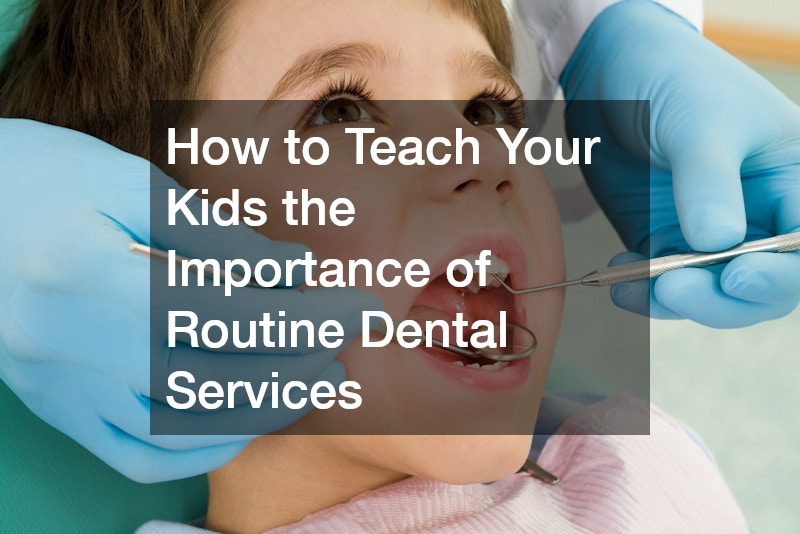How to Teach Your Kids the Importance of Routine Dental Services


When it comes to children’s dental health, routine dental services play a crucial role in maintaining a healthy smile. From family dentists to pediatric dentists, there are various professionals who can help ensure that your child’s teeth are in optimal condition. In this article, we will explore the importance of routine dental visits for children and how parents can make these visits a positive experience for their little ones.
Understanding the Basics of Dental Health

Family dentists are trained to provide a wide range of dental services, including routine check-ups, cleanings, and preventive care. By visiting a family dentist regularly, children can establish good oral hygiene habits from a young age. These routine dental services can help prevent cavities, gum disease, and other dental issues.
During routine dental visits, family dentists will also educate children and their parents about the importance of proper dental care. By understanding the basics of dental health, children can take better care of their teeth and gums at home.
Family dentists can also provide treatments such as fluoride applications and dental sealants to protect children’s teeth from decay. These preventive measures can help children maintain a healthy smile for years to come.
Starting Early: The Importance of First Visits
Visiting a pediatric dentist for the first time is a milestone in a child’s life. Pediatric dentists specialize in caring for children’s dental health and understand the unique needs of young patients. By starting early with routine dental services, parents can help their children develop a positive attitude towards dental care.
During first visits to a pediatric dentist, children will receive a thorough dental exam and cleaning. This initial appointment allows the dentist to assess the child’s oral health and identify any potential issues early on. By establishing a relationship with a pediatric dentist, children can build trust and feel comfortable during future visits.
Pediatric dentists also provide valuable guidance on oral hygiene practices and diet recommendations to promote healthy teeth and gums. By emphasizing the importance of first visits, parents can set their children up for a lifetime of good dental habits.
Making Dental Visits Fun
Creating a positive and welcoming environment at the dental office can help make routine dental visits more enjoyable for children. Pediatric dental offices are designed to be kid-friendly, with colorful decor, toys, and games to keep young patients entertained. By making dental visits fun, parents can help reduce any anxiety or fear their children may have about seeing the dentist.
Dental hygienists and dentists who work with children are trained to communicate in a gentle and friendly manner, helping children feel at ease during their appointments. They may use storytelling or role-playing to explain dental procedures in a way that is easy for children to understand. By making dental visits a positive experience, parents can instill a lifelong appreciation for oral health in their children.
Some dental offices also offer rewards or incentives for good behavior during routine dental services, such as stickers or small prizes. These positive reinforcements can motivate children to take an active role in caring for their teeth and gums. By making dental visits fun and rewarding, parents can help their children develop a positive attitude towards oral hygiene.
Establishing a Dental Routine at Home

In addition to regular dental visits, parents play a crucial role in helping their children maintain good oral hygiene at home. Pediatric dentistry emphasizes the importance of daily brushing and flossing to prevent cavities and gum disease. By establishing a dental routine at home, parents can instill healthy habits in their children from a young age.
Parents should supervise their children’s brushing and flossing habits to ensure they are thorough and effective. Pediatric dentists recommend using fluoride toothpaste and teaching children to brush their teeth for at least two minutes twice a day. By making oral hygiene a priority, parents can help their children have strong and healthy teeth.
Regular visits to a pediatric dentist can also help reinforce the importance of good oral hygiene practices at home. Pediatric dentists can provide tips and advice on proper brushing and flossing techniques, as well as recommend dental products that are suitable for children. By working together with a pediatric dentist, parents can help their children develop a strong foundation for a lifetime of healthy smiles.
Using Visual Aids
Visual aids can be a helpful tool in teaching children about the importance of routine dental services. Pediatric dentist offices often use educational videos, models, and charts to explain dental procedures and oral hygiene practices in a visual way. By using visual aids, pediatric dentists can make complex dental concepts easier for children to understand.
Children are naturally curious and visual learners, so incorporating visual aids into dental education can enhance their understanding and retention of information. By showing children the effects of poor dental hygiene, such as cavities or gum disease, visual aids can motivate them to take better care of their teeth. By using visual aids during dental visits, pediatric dentists can empower children to play an active role in maintaining their oral health.
Parents can also use visual aids at home to reinforce the importance of dental care. By displaying posters or pictures that illustrate proper brushing and flossing techniques, parents can help their children remember to take care of their teeth every day. By utilizing visual aids, parents can make dental hygiene a fun and engaging part of their children’s daily routine.
Educating About Healthy Eating
Good dental health is not just about brushing and flossing – it also involves making healthy food choices. Local dentists often educate children and their parents about the relationship between diet and oral health. By promoting a balanced diet rich in fruits, vegetables, and calcium-rich foods, local dentists can help children maintain strong and healthy teeth.
Sugary and acidic foods can contribute to tooth decay and other dental problems, so it’s important for children to limit their intake of these harmful substances. Local dentists can provide guidance on how to make healthy food choices that support good oral health. By teaching children about the importance of healthy eating, local dentists can help them develop lifelong habits that benefit their teeth and overall well-being.
Parents can support their children’s oral health by providing nutritious meals and snacks that are low in sugar and high in nutrients. By encouraging healthy eating habits and routine dental services, parents can help protect their children’s teeth from cavities and promote strong enamel. By working together with local dentists to educate children about healthy eating, parents can set the stage for a lifetime of good dental health.
Making Dental Hygiene Interactive

Cosmetic dentists focus on the aesthetic aspects of dentistry, but they also play a role in promoting good dental hygiene. By making dental hygiene interactive and engaging, cosmetic dentists can help children develop a positive attitude towards oral care. Cosmetic dentists may use interactive tools or games to teach children about the importance of routine dental services.
Children who are actively involved in their own dental care are more likely to take ownership of their oral health. By engaging children in interactive activities such as brushing challenges or dental trivia games, cosmetic dentists can make dental hygiene fun and exciting. By incorporating interactive elements into dental visits, cosmetic dentists can empower children to be proactive about taking care of their teeth.
Cosmetic dentists can also provide tips on how to maintain a bright and healthy smile, such as avoiding smoking and limiting consumption of staining foods and beverages. By educating children about the importance of cosmetic dental care, cosmetic dentists can help them understand the role of aesthetics in overall oral health. By making dental hygiene interactive, cosmetic dentists can inspire children to prioritize their oral care and take pride in their smiles.
Rewarding Good Behavior
Local cosmetic dentists may use positive reinforcement to reward children for good behavior during dental visits. By offering rewards such as stickers, toys, or praise, local cosmetic dentists can motivate children to cooperate during appointments. Rewarding good behavior can help children feel more comfortable and relaxed during routine dental services.
Children who receive positive reinforcement for their behavior are more likely to have a positive attitude towards dental care. By acknowledging and praising children for sitting still, opening wide, or following instructions, local cosmetic dentists can create a supportive and encouraging environment. By rewarding good behavior, local cosmetic dentists can help children associate dental visits with positive experiences.
Parents can also reinforce good behavior at home by praising their children for practicing good oral hygiene and taking care of their teeth. By celebrating their children’s achievements in dental care, parents can inspire them to continue making healthy choices. By working together with local cosmetic dentists to reward good behavior, parents can help their children feel confident and empowered when it comes to dental visits.
Teaching About Consequences
Braces treatment is a common orthodontic intervention that can improve the alignment of teeth and bite. Local dentists may recommend braces for children who have crooked or misaligned teeth to prevent dental issues in the future. By teaching children about the consequences of untreated orthodontic problems, local dentists can emphasize the importance of orthodontic treatments.
Children who undergo braces treatment may need to practice extra diligence in their oral hygiene routine to keep their teeth and braces clean. Local dentists can provide guidance on how to brush and floss effectively while wearing braces to prevent cavities and gum disease. By educating children about the consequences of poor oral hygiene with braces, local dentists can motivate them to take care of their teeth and braces properly.
Parents can support their children during braces treatment by encouraging them to follow their dentist’s recommendations for oral care. By emphasizing the benefits of braces and the potential outcomes of neglecting oral hygiene, parents can help their children understand the importance of orthodontic treatments. By teaching children about the consequences of untreated orthodontic problems, local dentists and parents can work together to ensure that children maintain healthy smiles for years to come.
Involving Them in Decision Making
Dental implants are a permanent solution for missing teeth that can restore a child’s smile and oral function. By involving children in the decision-making process about dental implants, parents can empower them to take control of their oral health. Local dentists can explain the benefits of dental implants and involve children in discussions about their treatment options.
Children who feel informed and involved in their dental care are more likely to comply with treatment recommendations and maintain good oral hygiene habits. By encouraging children to ask questions and express their preferences, local dentists can help them feel comfortable and confident about their dental treatment. By involving children in decision making about dental implants, parents can support their children in achieving a healthy and beautiful smile.
Parents can also discuss the financial aspects of dental implants with their children and explore payment options that work for their family. By involving children in budgeting and planning for routine dental services, parents can teach them valuable lessons about responsibility and the importance of investing in their oral health. By involving children in decision making about dental implants, parents can help them understand the long-term benefits of this restorative treatment.
Scheduling Regular Dental Check-ups

Regular dental check-ups are essential for maintaining good oral health and preventing dental problems. Routine dental services include exams, cleanings, and preventive treatments that can help children maintain healthy teeth and gums. By scheduling regular dental check-ups with a family dentist or pediatric dentist, parents can ensure that their children receive the care they need to keep their smiles bright.
During dental check-ups, dentists will assess the child’s oral health, clean their teeth, and provide personalized recommendations for oral care. Dental services may also include fluoride treatments, dental sealants, and X-rays to detect any potential issues early on. By attending regular dental appointments, parents can stay informed about their children’s oral health and address any concerns proactively.
Preventive dental care is key to maintaining a healthy smile, so it’s important for children to visit their dentist at least twice a year. By prioritizing dental services and scheduling regular check-ups, parents can help their children establish good oral hygiene habits that will benefit them for a lifetime. By making dental visits a priority, parents can support their children in achieving optimal oral health.
Routine dental services are essential for maintaining children’s oral health and promoting healthy smiles. From family dentists to pediatric dentists, there are various professionals who can provide the necessary care and guidance to ensure that children’s teeth are in optimal condition. By starting early with first visits, making dental visits fun, establishing a dental routine at home, and involving children in decision making, parents can help their children develop a positive attitude towards oral care. By prioritizing regular dental check-ups and educating children about the consequences of neglecting oral health, parents can empower their children to take charge of their dental hygiene and enjoy a lifetime of healthy smiles.






